【译林牛津版】英语选修六:Unit1重点词汇讲解和练习(含答案)
牛津译林版英语选修6讲义:Unit 1 Section Ⅰ Welcome to the unit
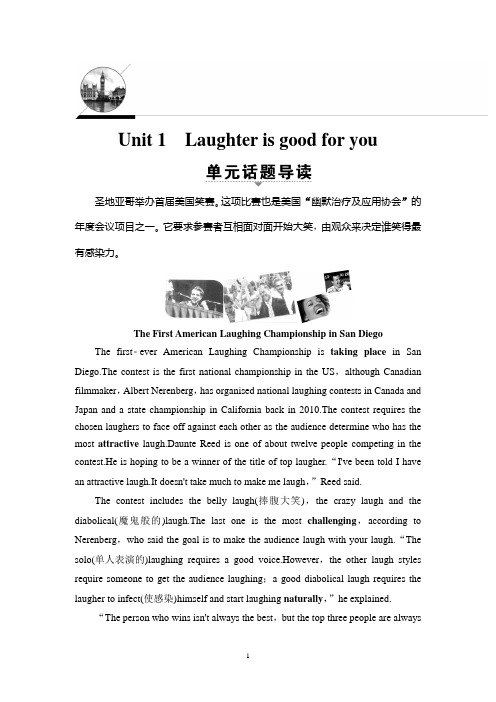
Unit 1Laughter is good for you圣地亚哥举办首届美国笑赛。
这项比赛也是美国“幽默治疗及应用协会”的年度会议项目之一。
它要求参赛者互相面对面开始大笑,由观众来决定谁笑得最有感染力。
The First American Laughing Championship in San Diego The firstever American Laughing Championship is taking place in San Diego.The contest is the first national championship in the US,although Canadian filmmaker,Albert Nerenberg,has organised national laughing contests in Canada and Japan and a state championship in California back in 2010.The contest requires the chosen laughers to face off against each other as the audience determine who has the most attractive laugh.Daunte Reed is one of about twelve people competing in the contest.He is hoping to be a winner of the title of top laugher.“I've been told I have an attractive laugh.It doesn't take much to make me laugh,”Reed said.The contest includes the belly laugh(捧腹大笑),the crazy laugh and the diabolical(魔鬼般的)laugh.The last one is the most challenging,according to Nerenberg,who said the goal is to make the audience laugh with your laugh.“The solo(单人表演的)laughing requires a good voice.However,the other laugh styles require someone to get the audience laughing;a good diabolical laugh requires the laugher to infect(使感染)himself and start laughing naturally,”he explained.“The person who wins isn't always the best,but the top three people are alwaysthe best.These people bring more joy to the world.They tend to be happy types.We've never had a sad person win so far,”he added.1.take place 发生;举行2.attractive adj. 吸引人的3.challenging adj. 挑战性的4.naturally ad v. 自然地,天生地5.tend to do sth. 倾向/易于做某事1.How many laughs does the contest include?2.Who are the best among the winners?【答案】 1.Three.2.The top three people.Section ⅠWelcome to the unit & Reading—Preparing根据提示写出下列单词1.adj. 每周的ad v. 每周(一次)n. 周刊;周报2.n. 舞台;阶段,时期3.v t.取笑;揶揄;戏弄4.adj. 先前的,以往的5.n. (同一事物)不同种类;多种样式6.v i.&v t.表现。
牛津译林版高中英语选修六高二英语模块六期末复习资料(unit1知识点)

高中英语学习资料madeofjingetieji高二英语模块六期末复习资料(unit 1知识点)Readingmake use of利用make sense of sth理解理解make notes of做笔make a decision作出决定make fun of讥笑make jokes about拿⋯开玩笑make room for⋯地方make comments做出be supposed to do做某事prefer to do prefer doing更喜做某事prefer to do⋯ rather than dopoint to 指向 a point of view点point out 指出in response to回响be responsible for sth某事take one ’ s responsibility某人肩负任walk into猛撞在⋯上trip over倒be popular with受迎sb ’ s popularity with某人遇到到迎a sense of humour风趣感queue up in line排等待not a bit = not at all一点也不not a little = very much 特别make up化弥造make out 理解make it 成功做某事定follow in the footsteps of=follow the example of以榜have effects on sth某事生影响= have a effect on sb or sth 本节句型1 One such person is Billy相当于 such a person is Billy似的有 any, some, no ,many ,all些均放在such 前 ,而碰到 a/an候用such a/an(册解 )2 One reason Crystal has become so famouse is his outstanding ability to improvise.常句型the reason why⋯ thatis 从句3. It seems to do sth= It seems that从句It seems + 形容 + that 从句Word powergive sb instructions about sth某人提出做某事的要求consist of = be made up of由⋯成sth occurs 或 occurred to sb某人忽然想到某事1. occur ,happy ,take place 都是不及物或短,不可以用于被。
高二英语译林版选修6练习:Unit1LaughterisgoodforyouSectionII含解析

Unit 1 Laughter is good for youSection ⅡGrammar练习一、复习下面的单词,并且选择合适的词完成句子。
2.The exercises are designed to ______ your stomach muscles。
3.Hillary Clinton was bold enough to ______ in the presidential campaign。
4.Failure hurts grownups and children alike,but it can make a ______contribution to your life once you learn to use it。
5.Equal treatment for all is ______ in this area,regardless of race,religion or sex。
6.The accident happened last night owing to his ______.二、单项选择1.When asked why he went there,he said he was sent there ______ for a space flight。
A.training B.being trained C.to have trained D.to be trained2.The girl glanced over her shoulder and found herself ______ by a young man in black。
A.was followed B.followedC.following D.had been followed3.There is nothing more I can try ______ you to stay,so I wish you good luck.A.being persuaded B.persuading C.to be persuaded D.to persuade4.Leonardo da Vinci(14521519)______ birds kept in cages in order to have the pleasure of setting them free.A.is said to be buying B.is said to have boughtC.had said to buy D.has said to have bought5.China recently tightened its waters controls near the Huangyan Island to prevent Chinese fishing boats from ______ in the South China Sea.A.attacking B.having attackedC.being attacked D.having been attacked6.After he became conscious,he remembered ______ and ______ on the head with a rod.A.to attack;hit B.to be attacked;to be hitC.attacking;be hit D.having been attacked;hit7.He got wellprepared for the job interview,for he couldn’t risk ______ the good opportunity。
高中英语选修6Unit 1重点梳理含答案

话题词汇1.abstract adj.抽象的2.exhibition n.展览3.style n.风格4.traditional adj.传统的5.typical adj.典型的;有代表性的6.inspiration n.灵感;启发7.art gallery画廊;美术馆8.work of art艺术作品9.under the influence of受……的影响10.break away from脱离;放弃话题佳作假如你叫李华,你的加拿大笔友Jean来信,表示想学习中国画,但是对中国画不太了解,请你根据下面内容,给Jean回信,简单介绍中国画的有关知识。
1.中国传统绘画是我国文化遗产的重要组成部分,历史悠久,深受人们的喜爱。
2.传统国画的作画工具有:毛笔、墨、宣纸(Xuan paper)、颜料(pigment)。
3.中国传统绘画的重要特征是诗、书(calligraphy)、画、印(seal)的完美结合。
4.中国历史上有许多传统的国画家,如齐白石,擅长画虾;徐悲鸿,对画马颇有研究。
佳作欣赏Dear Jean,I am very glad to learn from your letter that you like Chinese painting.The traditional Chinese painting,an important part of our country’s cultural heritage,has a long history.It is very popular among people at home and abroad.What we need for painting are writing brushes,Chinese ink,Xuan paper and pigments.Besides,an important feature of Chinese painting is that a painter should combine pictures,poems,calligraphy and seals perfectly.In fact,many painters are at the same time a calligrapher and a poet as well.In Chinese history,there are many famous traditional painters,including Qi Baishi and Xu Beihong.Qi Baishi was proficient in painting little shrimps while Xu Beihong was famous for his lively horses.Yours,Li Hua 名师点睛本文熟练地运用了各类复合句,如主语从句、宾语从句、表语从句等。
高中英语(牛津译林版)选修六配套文档Unit 1 Period Four Word版含答案
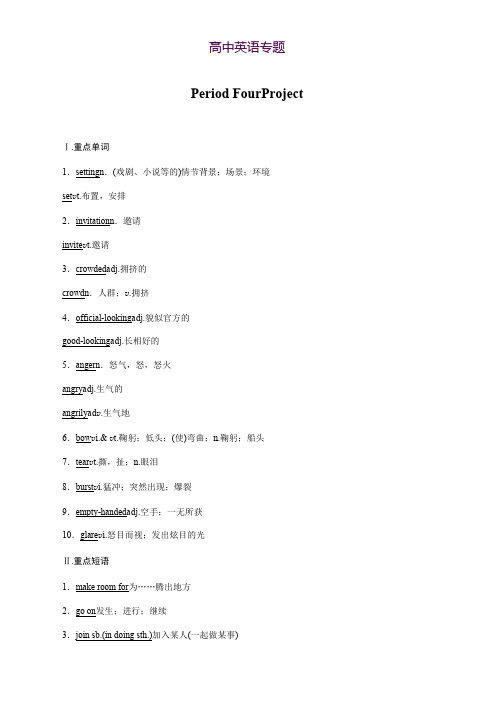
Period FourProjectⅠ.重点单词1.setting n.(戏剧、小说等的)情节背景;场景;环境set v t.布置,安排2.invitation n.邀请invite v t.邀请3.crowded adj.拥挤的crowd n.人群;v.拥挤4.official-looking adj.貌似官方的good-looking adj.长相好的5.anger n.怒气,怒,怒火angry adj.生气的angrily ad v.生气地6.bow v i.& v t.鞠躬;低头;(使)弯曲;n.鞠躬;船头7.tear v t.撕,扯;n.眼泪8.burst v i.猛冲;突然出现;爆裂9.empty-handed adj.空手;一无所获10.glare v i.怒目而视;发出炫目的光Ⅱ.重点短语1.make room for为……腾出地方2.go on发生;进行;继续3.join sb.(in doing sth.)加入某人(一起做某事)4.dash out冲出去5.at once立刻6.burst in闯进;突然闯入7.present sth.to sb.将某物呈献给某人;颁发某物给某人8.glare at对……怒目而视9.hold out递出;拿出;伸出10.as fast as possible/one can 尽可能快地Ⅲ.重点句式1.as if引导的条件状语从句中的省略Of course.(moves over as if to make room for Tony)当然。
(挪了挪,好像是要为托尼腾出地方)2.must have doneNo.I must have forgotten to tell you.对。
我一定是忘记告诉你们了。
Ⅰ.课文阅读理解1.How many characters are in the play Thein v isiblebench? A.One. B.Two.C.Four. D.Five.答案D2.In the play Thein v isiblebench,who enters last? A.Mike. B.Ann.C.Cathy. D.Paula.答案B3.In the play Thein v isiblebench,who “moved the bench”?A.Mike. B.Ann.C.Paula. D.Cathy.答案A4.In the play Theimportantpapers,what on earth does the King want?A.A newspaper. B.A magazine.C.A roll of toilet paper. D.A dictionary.答案C5.In the play Theimportantpapers,the servant can call the King “”.A.Your Majesty B.Your HighnessC.Darling D.Both A and B答案DⅡ.课文阅读填空Play Thein v isiblebench TheimportantpapersThe 1.type/kind of the comedies Physical:Actors use their bodies toperform the play.Prop:Actors use props—toiletpaper and some other papers toperform the play.2.Characters Five students The King,the Queen,the3.ServantSetting A park The palacePlot Some students 4.pretend to be sittingon an invisible bench and 5.enjoythemselves quite a lot.One of themmoves the bench without beingnoticed,so the others all fall downwhen the 6.truth/fact is told.The King wants some toiletpaper,7.but/while he saysthat he wants importantpapers.Because he is theKing,the servant8.mistakes/takes the importantpapers for some official documents.Finally,the servant understands him and 9.brings him what he wants.Funny point Since the bench can not be10.seen,nobody knows whether it isthere unless someone speaks it out.A play in which such words areused:important papers andtoilet paper.Ⅲ.课文阅读简答1.What kind of plays are they? Comedy or tragedy?Both of them are comedy.2.In the second play,why were the others unable to understand the King?Because the King expressed his opinion in a roundabout(拐弯抹角的) way and he said that he wanted his important papers;the others would mistake them for some official documents.重点词汇1.tears the paper in two把报纸撕成两半[归纳拓展]tear v.撕裂,撕碎;n.眼泪tear...in two把……撕成两半tear...into pieces把……撕碎tear at sth.撕扯某物(强调动作)tear down拆除[语境助记](1)She tore at the cloth but couldn’t tear it.她撕这块布,但没有撕开。
牛津译林版选修6 Unit 1 重点基础知识过关默写检测题(含答案)
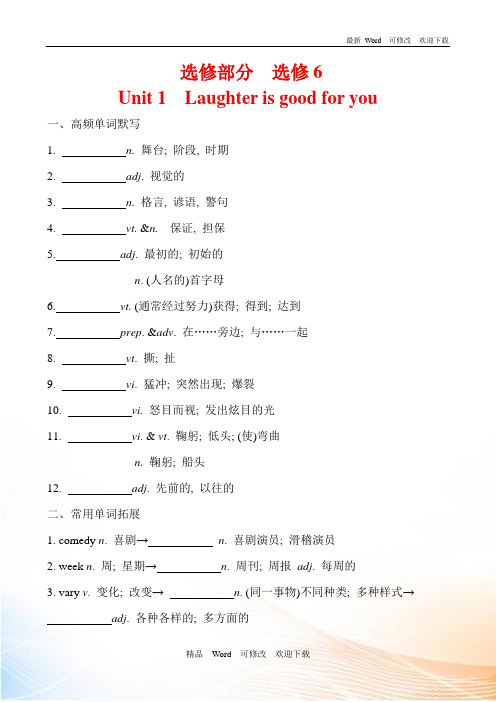
选修部分选修6Unit 1Laughter is good for you一、高频单词默写1. n. 舞台; 阶段, 时期2. adj. 视觉的3. n. 格言, 谚语, 警句4. vt. &n. 保证, 担保5.adj. 最初的; 初始的n. (人名的)首字母6.vt. (通常经过努力)获得; 得到; 达到7.prep. &adv. 在……旁边; 与……一起8. vt. 撕; 扯9. vi. 猛冲; 突然出现; 爆裂10. vi. 怒目而视; 发出炫目的光11. vi. & vt. 鞠躬; 低头; (使)弯曲n. 鞠躬; 船头12. adj. 先前的, 以往的二、常用单词拓展1. comedy n. 喜剧→n. 喜剧演员; 滑稽演员2. week n. 周; 星期→n. 周刊; 周报adj. 每周的3. vary v. 变化; 改变→ n. (同一事物)不同种类; 多种样式→adj. 各种各样的; 多方面的4. behave vi. & vt. 表现→n. 行为; 表现5. perform vi. & vt. 演出, 表演; 做, 履行; 工作, 运转→n. 表演; 演出; 表现, 业绩→ n. 表演者; 演员6. technique n. 技术, 技巧; 技能→adj. 技术的; 技能的→adv. 技巧上, 与技术有关地→n. 技术; 科技7. amuse vt. 逗笑, 逗乐; 提供(消遣), (使)娱乐→ adj. 有趣的; 引人发笑的→ adj. 愉快的; 被逗乐的→ n. 消遣, 娱乐, 乐趣8. fit adj. 健康的, 合适的→n. 健壮; 健康; 适合9. strong adj. 坚强的, 强壮的→ n. 力量, 力气→ vi. & vt. 增强; 巩固10. participate vi. 参加, 参与→ n. 参加者, 参与者→n. 参加, 参与11. positive adj. 积极的; 正面的; 肯定的→ adj. 消极的; 负面的; 否定的12. instruct vt. 教授, 传授; 指示, 命令; 告知→n. 教授; 指示, 命令; 说明→ adj. 有教育意义的; 有启发性的→ n. 教练, 导师13. invite vt. 邀请→ n. 邀请14. crowd vi. & vt. 拥挤, 挤满n. 人群→ adj. 拥挤的15. anger n. 怒, 怒火, 怒气→adj. 发怒的, 生气的→adv. 生气地, 气愤地三、重点短语默写1. 支持; 维护2.绊倒3. 拿……开玩笑; 取笑; 嘲弄4.喜爱; 钟爱5.想出; 拿出6. 去世; 亡故7. 赶走; 驱赶8. 接纳; 呈现; 承担9.为……腾出地方10. 闯入; 突然闯入11. 对……怒目而视12. 递出; 拿出; 伸出四、经典句式默写1. (这样的一个人)is Billy Crystal. (such与数词或不定代词any, some, no 等连用时, 常置于这些词之后)2. He said, “(看起来……是合适的)he got his start in silent films! ”(It seems +adj. +that主语从句)3. (这是因为……)laughter strengthens the heart and the lungs.( because引导表语从句)4. (你下次感到心烦意乱或失望时), do not worry.(the next time用作从属连词, 引导时间状语从句)5.It’s hard work, but it’s worth it , because you can see the audience enjoying(无论你说什么). (whatever引导名词性从句)6. He moves over (好像是要给托尼腾出空间). (as if引导的状语从句的省略)选修部分选修6Unit 1Laughter is good for you一、高频单词默写1. stage n. 舞台; 阶段, 时期2. visual adj. 视觉的3. saying n. 格言, 谚语, 警句4. guarantee vt. &n. 保证, 担保5. initial adj. 最初的; 初始的n. (人名的)首字母6. attain vt. (通常经过努力)获得; 得到; 达到7. alongside prep. &adv. 在……旁边; 与……一起8. tear vt. 撕; 扯9. burst vi. 猛冲; 突然出现; 爆裂10. glare vi. 怒目而视; 发出炫目的光11. bow vi. & vt. 鞠躬; 低头; (使)弯曲n. 鞠躬; 船头12. previous adj. 先前的, 以往的二、常用单词拓展1. comedy n. 喜剧→comedian n. 喜剧演员; 滑稽演员2. week n. 周; 星期→weekly n. 周刊; 周报adj. 每周的3. vary v. 变化; 改变→ variety n. (同一事物)不同种类; 多种样式→ various adj. 各种各样的; 多方面的4. behave vi. & vt. 表现→ behaviour n. 行为; 表现5. perform vi. & vt. 演出, 表演; 做, 履行; 工作, 运转→performance n. 表演;演出; 表现, 业绩→ performer n. 表演者; 演员6. technique n. 技术, 技巧; 技能→technical adj. 技术的; 技能的→ technically adv. 技巧上, 与技术有关地→technology n. 技术; 科技7. amuse vt. 逗笑, 逗乐; 提供(消遣), (使)娱乐→ amusing adj. 有趣的; 引人发笑的→ amused adj. 愉快的; 被逗乐的→ amusement n. 消遣, 娱乐, 乐趣8. fit adj. 健康的, 合适的→fitness n. 健壮; 健康; 适合9. strong adj. 坚强的, 强壮的→ strength n. 力量, 力气→ strengthen vi. & vt. 增强; 巩固10. participate vi. 参加, 参与→ participant n. 参加者, 参与者→ participation n. 参加, 参与11. positive adj. 积极的; 正面的; 肯定的→ negative adj. 消极的; 负面的; 否定的12. instruct vt. 教授, 传授; 指示, 命令; 告知→instruction n. 教授; 指示, 命令; 说明→ instructive adj. 有教育意义的; 有启发性的→ instructor n. 教练, 导师13. invite vt. 邀请→ invitation n. 邀请14. crowd vi. & vt. 拥挤, 挤满n. 人群→ crowded adj. 拥挤的15. anger n. 怒, 怒火, 怒气→ angry adj. 发怒的, 生气的→ angrily adv. 生气地, 气愤地三、重点短语默写1. stand up for支持; 维护2. trip over绊倒3. make fun of拿……开玩笑; 取笑; 嘲弄4. have affection for喜爱; 钟爱5. come up with想出; 拿出6. pass away去世; 亡故7. drive away赶走; 驱赶8. take on接纳; 呈现; 承担9. make room for为……腾出地方10. burst in闯入; 突然闯入11. glare at对……怒目而视12. hold out递出; 拿出; 伸出四、经典句式默写1. One such person(这样的一个人)is Billy Crystal. (such与数词或不定代词any, some, no 等连用时, 常置于这些词之后)2. He said, “It seems appropriate that(看起来……是合适的)he got his start in silent films! ”(It seems +adj. +that主语从句)3. This is because(这是因为……)laughter strengthens the heart and the lungs.( because引导表语从句)4. The next time you feel upset or disappointed(你下次感到心烦意乱或失望时), do not worry.(the next time用作从属连词, 引导时间状语从句)5. It ’s hard work, but it ’s worth it , because you can see the audience enjoying whatever you say (无论你说什么). (whatever 引导名词性从句)6. He moves over as if to make room for Tony (好像是要给托尼腾出空间). (as if 引导的状语从句的省略)1、在最软入的时候,你会想起谁。
高中英语(牛津译林版)选修六配套文档Unit 1 Period One Word版含答案

Mr. BeanYou must have seen this man somewhere—funny-looking,always in a jacket and a red tie. He seldom talks but always acts humorously.Who is he?He is the well-known Mr.Bean,who is very popular with most people all over the world and he always makes us laugh by means of his funny body language.Mr. Bean is the main character in the British comedy television series of the same name.It was written by Rowan Atkinson,Robin Driscoll,Richard Curtis and Ben Elton.The first episode was shown on 1st January 1990 and its final episode GoodNight,Mr. Bean was shown on 31st October 1995.During its five-year run,the series gained a large audience in the UK and throughout the world.People are most amused by the antics(滑稽动作) of Mr.Bean—a child in a grown man’s body.Mr.Bean often seems short of worldly(善于处事的)experience.The program usually shows his attempts to complete what would normally be considered simple tasks,such as going swimming or taking an exam.But he is quite not clever in dealing with the problems presented to him each time. The humor largely comes from his original solutions to any problem and his total disregard for others when solving them.The role of Mr.Bean is played by Rowan Atkinson—an Oxford University graduate.Atkinson is considered to be a great comedian in the style of Charlie Chaplin.People are very impressed by his humor.If you enjoy Mr. Bean,please enjoy his shows—Mr. Bean!阅读短文,判断正(T)误(F)1.Mr. Bean used to make the people laugh by his humorous words. (F)2.Mr. Bean always seems very clever when he deals with the problems in his life. (F)3.An Oxford University graduate plays the role of Mr. Bean.(T)Period OneWelcome to the unit & ReadingⅠ.重点单词1.comedy n.喜剧2.weekly n.周刊;周报;adj.每周的week n.周,星期3.tease v t.取笑;揶揄;戏弄4.previous adj.先前的,以往的5.variety n.(同一事物)不同种类;多种样式various adj.不同的,各种各样的vary v t.& v i.变化,不同6.style n.风格;方式;样式7.behave v i.&v t.表现behavio(u)r n.表现8.performance n.表演,演出;表现,业绩perform v t.& v i.表演,演出;做,履行;工作,运转performer n.演员;表演者9.little-known adj.鲜为人知的10.technical adj.技术的;技能的technology n.技术technically ad v.从技术上来说11.amuse v t.逗笑,逗乐;提供(消遣),(使)娱乐amusement n.娱乐12.saying n.格言,警句,谚语Ⅱ.重点短语1.stand up for支持,维护2.depend/rely on/upon依赖,依靠3.react to 对……做出反应4.queue up排队5.trip over绊倒6.make fun of拿……开玩笑;取笑,嘲弄7.have affection for喜爱,钟爱8.come up with想出;拿出9.follow in one’s footsteps/follow the footsteps of sb.效法某人,以某人为榜样10.pass away去世,亡故Ⅲ.重点句式1.while引导让步状语从句While this kind of humour may sound cruel,it usually only works if both the comedian and the audience have affection for or admire the person being made fun of.这种幽默听起来有点刻薄,但通常只有当喜剧演员和观众都喜欢或者崇拜这个被取笑的对象时,这种幽默才奏效。
高中英语(牛津译林版)选修六配套文档Unit 1 Period Three Word版含答案

Period ThreeTaskⅠ.重点单词1.foreigner n.外国人foreign adj.外国的2.instruct v t.教授,传授;命令,指示;告知instruction n.命令3.initial adj.最初的,初始的;n.(人名的)首字母initially ad v.最初,开始4.attain v t.(通常经过努力)获得;得到;达到5.polish v t.提高;修改;润色Ⅱ.重点短语1.take on接纳2.have an interest in对……感兴趣3.move on to (doing) sth.继续;继续前进;开始做(别的事);换(话题)4.go with与……相配5.in regard to关于Ⅲ.重点句式1.once 引导时间状语从句Once they have polished their skills,some of his students go on to become quite well known themselves.一旦他们掌握了这些技巧,他的一些学生便会继续下去,直到自己变得非常出名。
2.why not...?So,if you want to try crosstalk lessons,why not study with a real old master?因此,如果你想尝试一下相声课,为什么不跟随一名真正的相声大师学习呢?重点词汇1.He has instructed students from over 70 different countries.他已指导过来自70多个不同国家的学生。
[归纳拓展](1)instruct v t.教授,传授;指示,命令;告知instruct sb.to do sth.指导某人做某事(2)instruction n.指示;说明书;使用指南(常用复数);[U]指导obey/follow instructions遵从指令/指示(3)instructive adj.有教育意义的,有启发性的(4)instructor n.指导员,教练注意:instruct表示“命令”时,后面宾语从句的谓语动词要用should do,should可以省略。
2018-2019学年高二英语译林版选修六讲义:Unit 1 Section Ⅱ Word版含答案

姓名,年级:时间:Ⅰ.单词拼写1.There is a lot of wisdom in the old saying (谚语)“no pains,no gains”.2.If an animal such as a wolf or a dog howls (嚎叫), it makes a long, loud, crying sound.3.She was held in deep affection (喜爱) by all her students。
4.Do n't take it seriously. Tracy’s only teasing (取笑,戏弄) us.5.She is good at designing advertisements, whose designs have a strong visual (视觉的) appeal。
6.I’ve read heaps of books about it and have taken part in varieties (不同种类) of activities.7.At every stage (时期) of life we take losses and grow in the process。
Ⅱ.拓展词汇8.comedy n.喜剧→comedian n.喜剧演员,滑稽演员9.variety n.(同一事物)不同种类;多种样式→various adj。
各种各样的→vary vt。
& vi。
改变,变化10.behave vi。
&vt.表现→behaviour n.举止,行为11.perform vt。
& vi.演出;表演;做;工作,运转,履行→performance n.表演,演出;表现,业绩→performer n.演员,表演者12.technical adj.技术的;技能的→technician n.技术人员→technology n.技术13.amuse vt。
2017-2018学年高中英语 专题01 Laughter is good for you试题(含解析)牛津译林版选修6

Unit 1 Laughter is good for you(一)爱笑的人更加健康的十大原因Laughter is said to be older than language. Even animals laugh. It is one of the most natural and beneficial things you can do for your body and mind. Whether you snort, chortle, cackle, exude a huge bel ly laugh, or have a weird little giggle that’s ever so characteristic of you, laughter is the best medicine. It’s a preventative medicine for almost every ailment! Science agrees and urges us all to lighten up and squeeze out more laughs every day. Researchers says that people who love to laugh are healthier and happier. Here’s a list of ten reasons why.笑一笑,十年少。
对动物来说也是。
关于修养身心你能做的最自然最有利的事就是笑了。
不管你是扑哧一笑,哈哈大笑,呵呵笑,捧腹大笑还是带有自己特征的奇怪的咯咯笑,笑都是最好的药。
笑是几乎所有疾病的预防药。
科学家对此表示同意并敦促我们放轻松,每天多挤出笑容。
研究人员也表示爱笑的人一般更健康快乐。
下面是爱笑的10个好处:10. They have reduced stress. 减轻压力In a recent study at the Indiana State University, researchers found that laughter can not only reduce stress, but also improve the chances to survive cancer and HIV. The simple act ofchortling can soothe tension throughout the body and also lower the body’s stress hormones.最近在印第安纳州立大学有一项研究,研究员发现笑声不但能减轻压力,还能提高癌症和艾滋病的治愈率。
英语选修6译林牛津nit 1ection I同步测试答案

英语选修6译林牛津版Unit 1(Section I)同步测试(答案)Ⅰ.词汇知识1.____________n.喜剧→____________n.喜剧演员,滑稽演员2.____________n.周刊,周报adj.每周的→____________n.周,星期3.____________adj.先前的,以往的→____________ad v.事先,以前4.____________n.不同种类,多种样式→____________adj.各种各样的,不同的5.____________v t.& v i.表现→____________n.行为,表现6.____________n.表演,演出,表现→____________v i.表演,执行→____________n.表演者7.____________n.喜爱,钟爱→____________v.影响,感染8.____________adj.技术的,技能的→____________n.技术9.____________v t.逗笑,逗乐,(使)娱乐→____________n.娱乐,高兴答案:edy comedian 2.weekly week 3.previouspreviously 4.variety various 5.behave behaviour6.performance perform performer7.affection affect8.technical technic9.amuse amusementⅡ.重点短语1.________________拿……来讲笑话2.________________ 排队3.________________ 依赖,依靠,信赖4.________________ 支持,维护5.________________ 绊倒6.________________ 拿……开玩笑;取笑,嘲笑7.________________ 喜爱,钟爱8.________________ 想出,提出9.________________ 编造10.________________ 受……的欢迎11.________________ 保持健康12.________________ 去世,亡故答案:1.make/tell jokes about... 2.queue up 3.rely on 4.stand up for 5.trip over 6.make fun of7.have affection e up with9.make up10.be popular with11.stay healthy12.pass awayⅢ.必背句型1.A stand-up comedian may tease an audience member,or might decide to tell different jokes________________how the audience reacted to his or her previous jokes.单口喜剧演员可以拿某一观众开玩笑,也可以根据观众的反应随机应变,说不同的笑话。
高中英语(牛津译林版)选修六配套文档Unit 1 Vocabulary Breakthrough Word版含答案
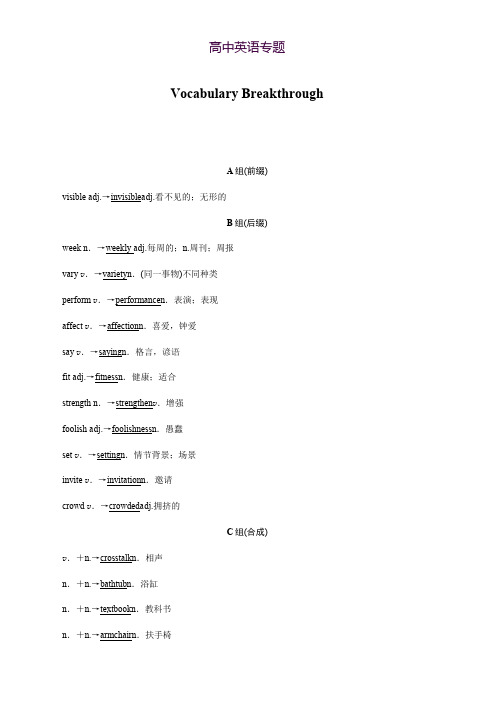
Vocabulary BreakthroughA组(前缀)visible adj.→invisible adj.看不见的;无形的B组(后缀)week n.→weekly adj.每周的;n.周刊;周报vary v.→variety n.(同一事物)不同种类perform v.→performance n.表演;表现affect v.→affection n.喜爱,钟爱say v.→saying n.格言,谚语fit adj.→fitness n.健康;适合strength n.→strengthen v.增强foolish adj.→foolishness n.愚蠢set v.→setting n.情节背景;场景invite v.→invitation n.邀请crowd v.→crowded adj.拥挤的C组(合成)v.+n.→crosstalk n.相声n.+n.→bathtub n.浴缸n.+n.→textbook n.教科书n.+n.→armchair n.扶手椅D组(转化)v.↔n. hammer 锤子;捶打howl 嚎叫bow 鞠躬n.↔adj.initial 最初的A组(同义词)saying n.↔proverb n.health n.↔fitness n.get v.↔attain v.improve v.↔polish n.&v.B组(反义词)empty adj.↔crowded adj.positive adj.↔negative adj.happiness n.↔anger n.C组(形近词)precious adj.↔previous adj.先前的,以往的amaze v.↔amuse v.逗乐;(使)娱乐1.背诵经典The performer is standing on the stage performing a stand-up.规范默写2.背诵经典The foreigner from some academy is instructing the employee how to use the electric hammer technically.规范默写3.背诵经典The comedian pretended to be tripped over,howling to amuse his audience.规范默写4.背诵经典He has affection for writing and often comes up with new ideas about articles by attaining enough information and then he dashes to tear a piece of paper to write them down.规范默写。
牛津译林版2018选修六配套文档:Unit 1 Period Two Word版含答案

Period Two Word power & Grammar and usageⅠ.重点单词1.fitness n.健壮,健康;适合fit adj.适合的;健康的;v t.(使)适合;n.合身(的衣服),适合2.strengthen v t.&v i.增强;巩固strength n.力量strong adj.强壮的,结实的3.participate v i.参加,参与participation n.参加,参与participant n.参加者,参与者4.positive adj.积极的;正面的;肯定的5.negative adj.负面的,消极的;否定的;坏的,有害的6.guarantee v t.&n.保证;担保7.foolishness n.愚蠢foolish adj.愚蠢的Ⅱ.重点短语1.in charge负责,主管2.be supposed to应该3.be divided into 被分为……4.make sure确保5.work out锻炼;做出;可以解决;计算出6.participate in参加,参与7.drive away赶走;驱赶8.be worth it值得Ⅲ.重点句式1.before引导时间状语从句If you want to be an actor,there are certain things you will need to know before you can be in a play.如果你想要成为一名演员,在你可以参与演出前你要知道一些事情。
2.祈使句+and+陈述句Don’t worry,just follow the stage directions that you have learnt,and say your lines,and you will do fine!不要担心,只要按照你学习的舞台说明做,说你的台词,你就会做得很好!3.动名词短语作主语First of all,laughing out loud helps improve your general fitness.首先,大笑帮助你提高你的基本身体素质。
高中英语(牛津译林版)选修六:Unit 1 Vocabulary Breakthrough 含答案

Vocabulary BreakthroughA组(前缀)visible adj.→invisible adj.看不见的;无形的B组(后缀)week n.→weekly adj.每周的;n.周刊;周报vary v.→variety n.(同一事物)不同种类perform v.→performance n.表演;表现affect v.→affection n.喜爱,钟爱say v.→saying n.格言,谚语fit adj.→fitness n.健康;适合strength n.→strengthen v.增强foolish adj.→foolishness n.愚蠢set v.→setting n.情节背景;场景invite v.→invitation n.邀请crowd v.→crowded adj.拥挤的C组(合成)v.+n.→crosstalk n.相声n.+n.→bathtub n.浴缸n.+n.→textbook n.教科书n.+n.→armchair n.扶手椅D组(转化)v.↔n. hammer 锤子;捶打howl 嚎叫bow 鞠躬n.↔adj.initial 最初的A组(同义词)saying n.↔proverb n.health n.↔fitness n.get v.↔attain v.improve v.↔polish n.&v.B组(反义词)empty adj.↔crowded adj.positive adj.↔negative adj.happiness n.↔anger n.C组(形近词)precious adj.↔previous adj.先前的,以往的amaze v.↔amuse v.逗乐;(使)娱乐1.背诵经典The performer is standing on the stage performing a standup.规范默写2.背诵经典The foreigner from some academy is instructing the employee how to use the electric hammer technically.规范默写3.背诵经典The comedian pretended to be tripped over,howling to amuse his audience.规范默写4.背诵经典He has affection for writing and often comes up with new ideas about articles by attaining enough information and then he dashes to tear a piece of paper to write them down.规范默写。
高二英语译林版选修6练习:Unit1Laughterisgoodforyou

Unit 1 Laughter is good for youSection ⅡGrammar练习2.The exercises are designed to ______ your stomach muscles.3.Hillary Clinton was bold enough to ______ in the presidential campaign.4.Failure hurts grownups and children alike,but it can make a ______contribution to your life once you learn to use it.5.Equal treatment for all is ______ in this area,regardless of race,religion or sex.6.The accident happened last night owing to his ______.二、单项选择1.When asked why he went there,he said he was sent there ______ for a space flight.A.training B.being trained C.to have trained D.to be trained 2.The girl glanced over her shoulder and found herself ______ by a young man in black.A.was followed B.followedC.following D.had been followed3.There is nothing more I can try ______ you to stay,so I wish you good luck.A.being persuaded B.persuading C.to be persuaded D.to persuade 4.Leonardo da Vinci(14521519)______ birds kept in cages in order to have the pleasure of setting them free.A.is said to be buying B.is said to have boughtC.had said to buy D.has said to have bought5.China recently tightened its waters controls near the Huangyan Island to prevent Chinese fishing boats from ______ in the South China Sea.A.attacking B.having attackedC.being attacked D.having been attacked6.After he became conscious,he remembered ______ and ______ on the head with a rod.A.to attack;hit B.to be attacked;to be hitC.attacking;be hit D.having been attacked;hit7.He got wellprepared for the job interview,for he couldn't risk ______ the good opportunity.A.to lose B.losing C.to be lost D.being lost8.—How do you deal with the disagreement between the company and the customers?—The key ______ the problem is to meet the demand ______ by the customers.A.to solving;making B.to solving;madeC.to solve;making D.to solve;made9.______ to sunlight for too much time will do harm to one's skin.A.Exposed B.Having exposedC.Being exposed D.After being exposed10.I really appreciate ______ to relax with you on this nice island.A.to have had time B.having timeC.to have time D.to having time11.The difference in thickness and weight from the earlier version makes the iPad 2 more comfortable ______.A.held B.holding C.be held D.to hold12.Passengers are permitted ______ only one piece of hand luggage onto the plane.A.to carry B.carrying C.to be carried D.being carried13.His first book ______ next month is based on a true story.A.published B.to be publishedC.to publish D.being published14.I remembered ______ the door before I left the office,but forgot to turn off the lights.A.locking B.to lockC.having locked D.to have locked15.Birds' singing is sometimes a warning to other birds ______ away.A.to stay B.staying B.stayed D.stay三、完形填空This economy has really got a lot of people moving and not always by a choice they wanted to make.My wife and I now find ourselves among those__1__feeling that pressure.Having been selfemployed__2__that we couldn't get unemployment assistance.As we did the math looking at retirement savings that were halfgone,we had to make the__3__decision to close up our office and put our house up for sale.We haven't lived in the house for two years yet and expected it would be the last one for a long time.How__4__this economic mess is changing our lives!This time we're in the process of moving without knowing where we'll__5__next.Both my wife and I had been feeling pretty depressed.__6__,it changed while I watched my wife packing things up.I took delight in __7__her size up just the right boxes for everything and fill in the gaps with pillows and towels .I began feeling something like a wind lift me up and sail me through my own__8__of the packing and loading.Some friends will be helping us with the moving.I've told them that they're not losing friends but __9__some new vacation spots.And I'm always happy to get to know the strangers who will be involved in our lives because of this kind of__10__.Home is wherever we are together regardless of where we go.I have faith that we'll get through this__11__finally.And by giving and receiving kindness along the path we will__12__strength and courage.1.A.supporters B.unfortunates C.favourites D.troubles2.A.explained B.proved C.checked D.meant3.A.painful B.pleasant C.wise D.dangerous 4.A.strangely B.smoothly C.luckily D.quickly5.A.arrive B.pay C.start D.separate6.A.However B.Moreover C.Meanwhile D.Therefore 7.A.persuading B.finding C.watching D.prohibiting 8.A.boat B.share C.wish D.promise9.A.grasping B.missing C.gaining D.refusing10.A.faith B.tradition C.change D.benefit11.A.revolution B.transition C.tragedy D.journey12.A.reduce B.lose C.enlarge D.accumulate四、语法填空Every day,in all kinds of weather,a lot of men and women go jogging (running slowly).__1__has jogging become so popular?Many people start jogging because they hear__2__is a very good form of exercise.Jogging makes the heart strong and helps people control their weight or stay slim.If you keep jogging regularly,you needn't take pills __3__miss meals to lose weight.Jogging can also make you feel better about yourself.Donald Robbins,who is 42 years old and works in an office,began jogging a few years ago because he felt he was overweight.At first he could __4__run about 300 metres,but two years later,he ran a marathon—over 42 kilometres.Do you jog?If you do,be sure to ask your doctor__5__advice.Does jogging cost much?Almost __6__.But it is very important to have a good pair of shoes__7__are made specially for jogging.If __8__,when you run on hard ground for a long time it may cause your feet to hurt.参考答案一、1.fitness 2.strengthen 3.participate 4.positive 5.guaranteed 6.foolishness二、1. D 解析:本题考查动词不定式作目的状语,而且根据句意“被派往那里接受训练”,可知须用不定式的被动形式。
2018版高中英语译林版选修6教师用书:Unit1单元尾核心要点回扣含解析

单元尾核心要点回扣Ⅰ.重点单词1.vt。
取笑;揶揄;戏弄2.vt。
&vi.表现;守规矩3.adj.积极的;正面的;肯定的4.vt.&n.保证;担保5.vt.指导→adj。
有教育意义的6.vt。
&vi.改变,变化→adj。
各种各样的→n.(同一事物)不同种类;多种样式7.vt。
&vi。
演出;表演;做;工作;运转;履行→n.表演,演出;表现,业绩→n.演员,表演者8.vt.逗笑,逗乐;提供(消遣),(使)娱乐→adj.被逗乐的→adj。
令人发笑的→n.愉快,开心9.vt.&vi。
喜欢;影响;感染;感动→n.喜爱;感情;影响;感染10.adj.强壮的→n.力量;力气;长处→vt.加强;巩固【答案】1。
tease 2.behave 3。
positive 4.guarantee 5。
instruct;instructive 6。
vary;various;variety 7.perform;performance;performer 8。
amuse;amused;amusing;amusement 9.affect;affection 10。
strength;strong;strengthenⅡ。
重点短语1.burst错误!2.take错误!3.hold错误!4.make错误!5.stand错误!Ⅲ.重点句式1.他说,这是因为小时候开始练习单口喜剧的时候,他总是站在镜子前面,边刷牙边给自己讲笑话.He says it is because when he started practising stand。
up as a child,he told himself jokes while standing in front of the mirror,brushing his teeth。
2.你下次感到心烦意乱或失望时,不要担心。
The next time you feel upset or disappointed,do not worry。
牛津译林版高中英语选修六Unit1SectionⅢ
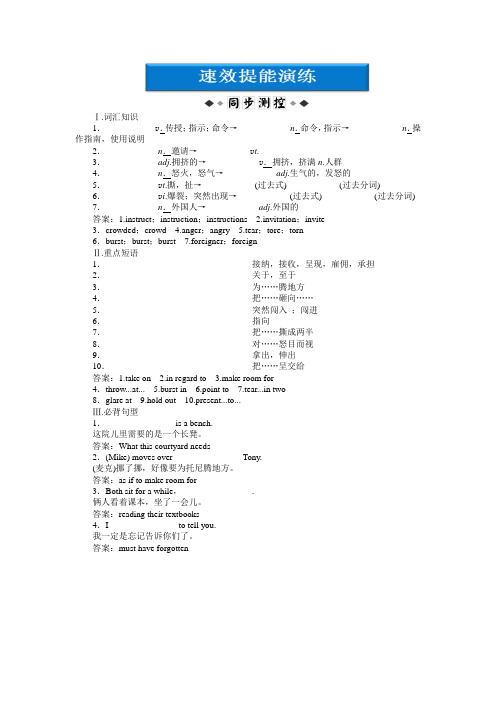
Ⅰ.词汇知识1.____________v.传授;指示;命令→____________n.命令,指示→____________n.操作指南,使用说明2.____________n.邀请→____________v t.3.____________adj.拥挤的→____________v.拥挤,挤满n.人群4.____________n.怒火,怒气→____________adj.生气的,发怒的5.____________v t.撕,扯→____________(过去式)____________(过去分词)6.____________v i.爆裂;突然出现→____________(过去式)____________(过去分词) 7.____________n.外国人→____________adj.外国的答案:1.instruct;instruction;instructions 2.invitation;invite3.crowded;crowd 4.anger;angry 5.tear;tore;torn6.burst;burst;burst7.foreigner;foreignⅡ.重点短语1.________________接纳,接收,呈现,雇佣,承担2.________________ 关于,至于3.________________ 为……腾地方4.________________ 把……砸向……5.________________ 突然闯入;闯进6.________________ 指向7.________________ 把……撕成两半8.________________ 对……怒目而视9.________________ 拿出,伸出10.________________ 把……呈交给答案:1.take on 2.in regard to 3.make room for4.throw...at... 5.burst in 6.point to7.tear...in two8.glare at9.hold out10.present...to...Ⅲ.必背句型1.________________is a bench.这院儿里需要的是一个长凳。
- 1、下载文档前请自行甄别文档内容的完整性,平台不提供额外的编辑、内容补充、找答案等附加服务。
- 2、"仅部分预览"的文档,不可在线预览部分如存在完整性等问题,可反馈申请退款(可完整预览的文档不适用该条件!)。
- 3、如文档侵犯您的权益,请联系客服反馈,我们会尽快为您处理(人工客服工作时间:9:00-18:30)。
U1 重点词汇讲解1.There are a variety of different styles of stand-up comedy.单口喜剧很很多种。
Variety—n.多种样式;多变性常用结构:a variety of / varieties of 多种多样的,种类繁多的,相当于形容词various1) There is a wide variety of patterns to choose from. 有种类繁多的图案可供选择。
2) This tool can be used in a variety of ways. 这种工具有多种用途。
3) She took the job for various reasons. 她由于种种原因接受了这份工作。
2.Some comedians tell jokes about the way people behave or about daily life.有些喜剧演员拿人们的行为方式或是日常生活开玩笑。
behave—v.表现一般与副词或介词连用1) The doctor behaved very unprofessionally. 那位医生的做法违反职业道德。
2) He behaved like a true gentleman. 他的行为像个真正的绅士。
【相关拓展】behave (oneself)表现得体;有礼貌3) I want you to behave yourself while I am away. 我不在家的时候你们要乖乖的。
4) She doesn’t know how to behave in public. 她在公共场合举止无措。
adv.-behaved 表现得……的如: well-behaved, badly-behaved5) The badly-behaved children are really a headache to me.那些表现得不好的孩子对我来说真头疼。
behavior n.行为,举止3.The last kind of comedian does impressions—he or she will act or speak likea wel l-known person in order to make fun of that person.最后一类会进行印象模仿—演员会模仿一个名人来表演或说话以取笑那个名人。
make fun of –开……的玩笑,嘲笑……意思相当于laugh at1) Don’t make fun of people with disabilities. 不要嘲笑残疾人。
【相关拓展】注意fun 是不可数名词,与fun有关的短语或句型有:have fun =have a good time 玩得开心It is fun to do sth. 做某事有趣2) What fun it is to do sth!做某事多有趣啊!3) What fun it is to walk in the snow! 在雪中散步真是有意思!4.People around the world enjoy watching him when he hosts the Academy Awards.全世界的人们都喜欢看他主持奥斯卡颁奖庆典。
award(1)n.奖;奖品;奖金;奖状1) He won an award for his good performance.他因表演得好而获奖。
2) People like to attend the award ceremony hosted by him.人们喜欢参加他主持的颁奖仪式。
(2)v.授予;奖励3) He was awarded the first prize. 他获得了一等奖。
4) The gold medal was awarded to Mr. Brown for his excellent performance.布朗先生因其优异的表现而获得了金牌。
【辨析】award / prize/ reward(1)award 意为“奖,奖品”,指对于优异成绩或卓越贡献经过评定后正式授予的奖励,可以是精神的,也可以是物质的,常用于奖项名称。
(2)prize意为“奖赏,奖品”,多指确认某人在竞赛中获得的优异成绩并给予特殊的奖励。
(3)reward意为“报答,酬劳”,并不指某种荣誉,而指应得的报酬;也可以做动词表示“给人以报酬、奖赏”。
1) He was nominated for the best actor award.他获得最佳男演员奖提名。
2) He won first prize in the English Speech Competition.他在英语演讲比赛中获一等奖。
3) He was rewarded for finding the lost dog.他因找到那只丢失的狗而获得报酬。
4) Winning the match was just reward for the effort the team had made.赢得比赛的胜利是全队付出努力应得的回报。
5.Each time, he performs his stand-up routine in front of millions of people whenthe show is broadcast live on TV. 每次,当节目在电视上现场直播时他都是在上百万人面前表演他的单口喜剧节目。
live(1)adv.现场地;直播地1) With all the news broadcast live, the pressure on the announcers is becomingheavier.随着新闻的直播,播音员的压力变得更大了。
(2)adj. 现场的,直播的;有生命的,活的2) We are watching the live coverage of the Olympics.我们正在观看奥运会实况报道。
3) She was frightened at the sight of a live snake. 看到一条活蛇她吓坏了。
注意:live 做“活着的”讲时,作定语要前置,一般不指人。
【辨析】live/ alive/ living/ livelylive adj.“活着的”(与dead想对应),只能做定语(指动物),另外还有“现场直播的”意思(反义词recorded “录制的,转播的”)alive adj.“活着的,健在的”,做表语;作定语需后置(一般用于人,有时也用于动物)living adj.“活着的;有生命的”。
既可以作定语,也可以作表语。
“生物”只能译作living thingslively adj.生动的,活泼的4) They are carrying out an experiment with a live monkey.他们正在用一只活的猴子做实验。
5) It was a live broadcast, not a recording. 这是现场直播而非转播。
6) Who is the greatest man alive? 谁是当今活着的最伟大的人?6. One reason Crystal has become so famous is that he is very quick thinking, andoften is able to come up with new jokes about the people and things around him. 克里斯托如此有名的一个原因是他思维敏捷,他经常能够想出关于周围的人或事的新笑话来。
come up with想出;拿出1) She came up with a new idea for increasing sales. 她想出了增加销售的新主意。
2) How soon can you come up with the money? 你什么时候能拿出这笔钱?【相关拓展】come up 发芽;(太阳)升起;被提及,被讨论come out(太阳,星星或月亮)出现,露出;开花;出版,发行come to合计,总计come acr oss(偶然)遇见,发现1) The bill came to $30. 账单金额总计为30元。
2) She came across some old photographs in a drawer. 她在抽屉里偶然发现了一些旧照片。
3) When is his new novel coming out? 他的新小说什么时候出版?4) The subject came up in conversation. 谈话中提到了这个话题。
7.Crystal’s popularity with all age groups and his ability to amuse people allover the world prove that stand-up can be enjoyed by everyone.克里斯托在各个年龄段人群之间的受欢迎程度和他愉悦全世界人们的能力证明人人都可能喜欢单口喜剧。
amuse vt.使愉快,使高兴1) He came up with a good idea to amuse the kids. 他想出了一个好主意来逗孩子开心。
【相关拓展】(1)amused adj.觉得好笑的(2)amusing adj. 逗人笑的,有趣的(3)amusement n. 可笑,愉悦,娱乐to one’s amusement =to the amusement of sb 令某人高兴的,好笑的是2) We are amused at his amusing stories. 我们都被他有趣的故事逗乐了。
3) To my amusement, he couldn’t get the door open. 使我感到好笑的是,他竟然打不开门。
8.It helps those who cannot work out become fit. 它能帮助那些不能运动的人变得健康。
work out 锻炼身体;成功地发展;计算出;制定(计划);处理,解决1) I work out regularly to keep fit. 我定期锻炼以保持健康。
2) It is not so easy to work out the problem. 要解决那个问题不是那么容易的。
3) My first job didn’t work out. 我的第一份工作干得不好。
